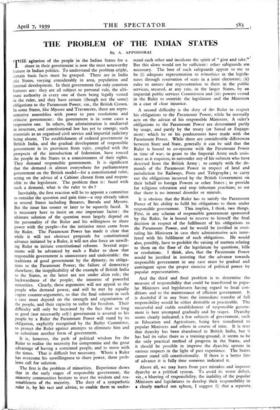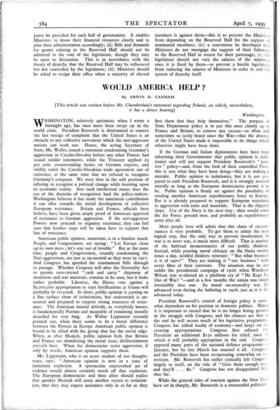THE PROBLEM OF THE INDIAN STATES
By A. APPODORAI
THE agitation of the people in the Indian States for a share in their government is now the most noteworthy feature in Indian politics. To understand the problem aright, certain basic facts must be grasped. There are in India 562 States, varying considerably in area, population and internal development. In their government the only common features are: they are all subject to personal rule, the ulti- mate authority in every one of them being legally vested in the ruler, and they have certain (though not the same) obligations to the Paramount Power, viz., the British Crown. In some States, like Mysore and Travancore, there are repre- sentative assemblies with power to pass resolutions and criticise government: the government is in some cases a responsive one. In others, the administration is mediaeval in structure, and constitutional law has yet to emerge, such essentials as an organised civil service and impartial judiciary being absent. The establishment of ordered government in British India, and the gradual development of responsible government in its provinces from 1921, coupled with the prospects of the introduction of federation, have roused the people in the States to a consciousness of their rights. They demand responsible government. It is significant that the demand .is almost everywhere for parliamentary government on the British model—for a constitutional ruler, acting on the advice of a Cabinet chosen from and respon- sible to the legislature. The problem then is: faced with such a demand, what is the ruler to do ?
Inevitably, the first reaction will be to appoint a committee to consider the question and gain time—a step already taken in several States including Benares, Baroda and Mysore. But the issue has sooner or later to be squarely faced. It is necessary here to insist on one important factor : the ultimate solution of the question must largely depend on the personality of the Ruler and his willingness to share power with the people—for the initiative must come from the Ruler. The Paramount Power has made it clear that while it will not obstruct proposals for constitutional advance initiated by a Ruler, it will not also force an unwill- ing Ruler to initiate constitutional reforms. Several argu- ments will be advanced by such a Ruler to show that responsible government is unnecessary and undesirable : the traditions of good government by the dynasty; its obliga- tions to the Paramount Power; the failure of democracy elsewhere; the inapplicability of the example of British India to the States, as the latter are not under alien rule; the backwardness of the people; the interests of powerful minorities. Clearly, these arguments will not appeal to the people who demand power, and will be met by equally cogent counter-arguments, so that the final solution in such a case must depend on the strength and organisation of the people, and their capacity to suffer for freedom. Their difficulty will only be increased by the fact that so long as good (not necessarily self-) government is assured to his people by a Ruler the Paramount Power will stand by its obligation, explicitly recognised by the Butler Committee, to protect the Ruler against attempts to eliminate him and to substitute another form of government.
It is, however, the path of political wisdom for the Ruler to realise the necessity for compromise and the great advantage of having a contented people, and to move with the times. That is difficult but necessary. Where a Ruler has overcome his unwillingness to share power, three prob- lems call for solution.
The first is the problem of minorities. Experience shows that in the early stages of responsible government, the minority communities hesitate to trust the wisdom and rea- sonableness of the majority. The duty of a sympathetic ruler is, by his tact and advice, to enable them to under- stand each other and inculcate the spirit of " give and take." / But this alone would not be sufficient: other safeguards area necessary. The best of such safeguards appear to me to be (i) adequate representation to minorities in the legisla- tures through reservation of seats in a joint electorate; (ii) rules to ensure due representation to them in the public services, secured, at any rate, in the larger States, by an impartial public services Commission and (iii) powers vested in the Ruler to override the legislature and the Ministers in a case of clear injustice.
A second difficulty is the duty of the Ruler to respect his obligations to the Paramount Power, while he normally acts on the advice of his responsible Ministers. A ruler's obligations to the Paramount Power are determined partly by usage, and partly by the treaty (or Sanad or Engage- ment) which he or his predecessors have made with the Paramount Power. While there are considerable differences between State and State, generally it can be said that the Ruler is bound to co-operate with the Paramount Power in time of war; to grant to the Imperial Army such assis- tance as it requires; to surrender any of his subjects who have deserted from the British Army ; to comply with the de- mands of the Paramount Power in respect of land and jurisdiction for Railways, Posts and Telegraphs ; to carry out the obligations incurred by the British Government on their behalf to foreign Powers or other States ; to provide for religious toleration and stop inhuman practices; to see that there is no internal disorder or misrule.
It is obvious that the Ruler has to satisfy the Paramount Power of his ability to fulfil his obligations to them under responsible government. This implies, I think, two things. First, in any scheme of responsible government sponsored by the Ruler, he is bound to reserve to himself the final decision in respect of the fulfilment of his obligations to the Paramount Power, and he would be justified in over- ruling his Ministers in case their administrative acts inter- fered with his fulfilment of such obligations. He would also, possibly, have to prohibit the raising of matters relating to them on the floor of the legislature by questions, bills or resolutions. I think, also that the Paramount Power would be justified in insisting that the advance towards responsible government in any case must be gradual and contingent upon the proper exercise of political power by popular representatives.
And the third and final problem is to determine the measure of responsibility that could be transferred to popu- lar Ministers and legislatures having regard to local con- ditions and to the maintenance of efficient government. It is doubtful if in any State the immediate transfer of full responsibility would be either desirable or practicable. The successful and stable establishment of responsible govern- ment is best attempted gradually and by stages. Dyarchy seems clearly indicated; a few subjects of government, such as Education and Agriculture, being first transferred to popular Ministers and others in course of time. It is true that dyarchy has been abandoned in British India, but has had its value there as a training-ground, it seems to be the only practical method of progress in the States, and it should be possible to improve the dyarchic system in various respects in the light of past experience. The States cannot stand still constitutionally. If there is a better line of advance it is fully time someone indicated it.
Above all, we may learn from past mistakes and improve dyarchy as a political system. To avoid its worst defect, viz., a blurring of responsibility, the inability of the popular Ministers and legislatures to develop their responsibility in a clearly marked out sphere, I suggest (i) that a separate, purse be provided for each half of government. It enables Ministers to know their financial resources clearly and to plan their administration accordingly; (ii) Bills and demands for grants relating to the Reserved Half should not be admitted to the vote of the legislature, though they may be open to discussion. This is in accordance with the theory of dyarchy that the Reserved Half may be influenced but not controlled by the legislature; (iii) Ministers should be asked to resign their office when a majority of elected members is against them—this is to prevent the Ministers from depending on the Reserved Half for the support of nominated members; (iv) a convention be developed that Ministers do not mortgage the support of their followers to the Reserved Half in return for their patronage; (v) the legislature should not vary the salaries of the ministers once it is fixed by them—to prevent a hostile legislature from reducing the salaries of Ministers in order to end the system of dyarchy itself.











































 Previous page
Previous page